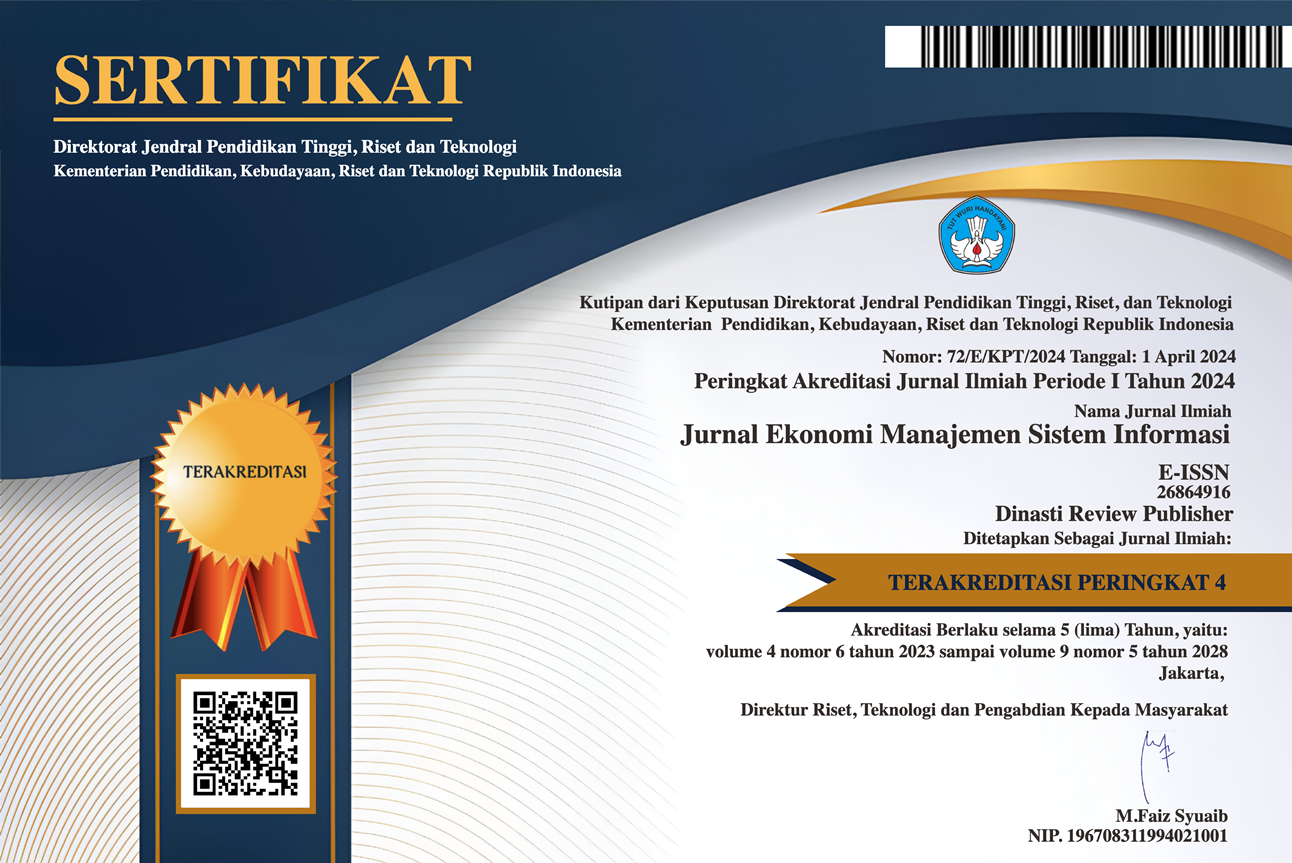Pengaruh Adopsi Teknologi, Budaya Organisasi, Kepemimpinan Transformatif terhadap Kinerja Karyawan
DOI:
https://doi.org/10.38035/jemsi.v5i3.1814Keywords:
Technology Adoption, Culture Organization, Transformational Leadership, Employee PerformanceAbstract
Technology is one of the most crucial aspects in the development of an organization to ensure its survival and gain a competitive advantage. Organizations adopt technology to enhance operational efficiency and productivity, thereby improving employee performance. This research employs a literature review method, where the researcher explores literature from international journals and documents related to the adoption of technology and employee performance. The results indicate that technology adoption influences employee performance by enhancing operational efficiency, minimizing human error, and reducing routine tasks, enabling employees to complete their work more quickly. Additionally, technology adoption facilitates accelerated communication within the organization, thereby enhancing the performance of individuals and teams through effective collaboration. Technology adoption also affects determinants of employee performance, such as employee satisfaction and engagement, work-life balance, employee motivation, absenteeism rates, and burnout. However, the adoption of new technology often faces skepticism or even rejection from employees if organizations do not follow proper implementation steps. Therefore, organizations need to understand employees' emotions during the adoption of new technology and manage these negative effects by providing appropriate training, access to necessary devices, and empathy and open communication from the organization. Finally, an adaptive and agile organizational culture is highlighted as the most influential strategy for the success of organizational adoption.
References
Adiguzel, Z., & Cakir, F. S. (2022). Examining the effects of strategic orientation and motivation on performance and innovation in the production sector of automobile spare parts. European Journal of Management Studies, 27(2), 131–153. https://doi.org/10.1108/ejms-01-2022-0007
Aguado, D., Andrés, J. C., García-Izquierdo, A. L., & Rodríguez, J. (2019). LinkedIn “Big Four”: Job Performance Validation in the ICT Sector. Revista de Psicología Del Trabajo y de Las Organizaciones, 35(2), 53–64. https://doi.org/10.5093/jwop2019a7
Apostolidis, C., Devine, A., & Jabbar, A. (2022). From chalk to clicks – The impact of (rapid) technology adoption on employee emotions in the higher education sector. Technological Forecasting and Social Change, 182. https://doi.org/10.1016/j.techfore.2022.121860
Audenaert, M., Decramer, A., George, B., Verschuere, B., & Van Waeyenberg, T. (2019). When employee performance management affects individual innovation in public organizations: the role of consistency and LMX. International Journal of Human Resource Management, 30(5), 815–834. https://doi.org/10.1080/09585192.2016.1239220
Bano, R., Ahmad, I., & Ullah, M. (2022). Impact of Green Transformational Leadership on Job Performance: The Mediating Role of Psychological Contract Fulfillment. Pakistan Journal of Commerce and Social Sciences, 16(2), 279–298.
Barney, J. (1991). Firm Resources and Sustained Competitive Advantage. Journal of Management, 17(1), 99–120. https://doi.org/10.1177/014920639101700108
Baskaran, S., Lay, H. S., Ming, B. S., & Mahadi, N. (2020). Technology Adoption and Employee’s Job Performance: An Empirical Investigation. International Journal of Academic Research in Economics and Management Sciences, 9(1). https://doi.org/10.6007/ijarems/v9-i1/7443
Behrman, D. N., & Perreault, W. D. (1982). Measuring the Performance of Industrial Salespersons. Journal of Buslness Research, 10, 355–370.
Borman, W. C., & Motowidlo, S. J. (1993). Expanding the criterion domain to include elements of contextual performance. In N. Schmitt & W. C. Borman (Eds.), Personnel Selection in Organizations (pp. 71–98). Jossey Bass.
Campbell, J. P. (1990). Modeling the Performance Prediction Problem in Industrial and Organizational Psychology. In Handbook of Industrial and Organizational Psychology (pp. 687–732). Consulting Psychologists Press.
Chen, X., Wei, S., Davison, R. M., & Rice, R. E. (2019). How do enterprise social media affordances affect social network ties and job performance? Information Technology & People, 33(1), 361–388. https://doi.org/10.1108/ITP-11-2017-0408
Chopra, G., Bhaskar, P., Vinay, M., & Joshi, A. (2022). E-government adoption and employees’ job performance: the moderating role of age as a demographic factor. Electronic Government, an International Journal, 18(2), 237. https://doi.org/10.1504/EG.2022.121871
Dalal, R. S. (2005). A Meta-Analysis of the Relationship Between Organizational Citizenship Behavior and Counterproductive Work Behavior. Journal of Applied Psychology, 90(6), 1241–1255. https://doi.org/10.1037/0021-9010.90.6.1241
Davis, F. D. (1989). Perceived usefulness, perceived ease of use, and user acceptance of information technology. MIS Quarterly: Management Information Systems, 13(3), 319–339. https://doi.org/10.2307/249008
Duan, S. X., Deng, H., & Wibowo, S. (2023). Technology Affordances for Enhancing Job Performance in Digital Work. Journal of Computer Information Systems. https://doi.org/10.1080/08874417.2023.2188497
Faeni, Dewi Puspaningtyas,. Faeni, Ratih Puspaningtyas,. Riyadh, Hosam Alden,. Yulinsyah,. (2022). The COVID-19 pandemic impact on the global tourism industry SMEs: a human capital development perspective. Journal for Studies in Management and Planning, 2(2), 1–16. http://ssrn.com/abstract=2791208
HM Suaidy dan ZT Rony. (2023). Pengaruh Gaya Kepemimpinan Transformasional terhadap Produktivitas Kerja : Studi Analisis Tinjauan Literatur Sistematik. https://ogzrespublish.com/index.php/JEB/article/view/5
Jiatong, W., Wang, Z., Alam, M., Murad, M., Gul, F., & Gill, S. A. (2022). The Impact of Transformational Leadership on Affective Organizational Commitment and Job Performance: The Mediating Role of Employee Engagement. Frontiers in Psychology, 13. https://doi.org/10.3389/fpsyg.2022.831060
Lai, P. (2017). The literature review of technology adoption models and theories for the novelty technology. Journal of Information Systems and Technology Management, 14(1), 21–38. https://doi.org/10.4301/S1807-17752017000100002
Nantee, N., & Sureeyatanapas, P. (2021). The impact of Logistics 4.0 on corporate sustainability: a performance assessment of automated warehouse operations. Benchmarking: An International Journal, 28(10), 2865–2895. https://doi.org/10.1108/BIJ-11-2020-0583
Narayanamurthy, G., & Tortorella, G. (2021). Impact of COVID-19 outbreak on employee performance – Moderating role of industry 4.0 base technologies. International Journal of Production Economics, 234. https://doi.org/10.1016/j.ijpe.2021.108075
Panari, C., Lorenzi, G., & Mariani, M. G. (2021). The predictive factors of new technology adoption, workers’ well-being and absenteeism: The case of a public maritime company in venice. International Journal of Environmental Research and Public Health, 18(23). https://doi.org/10.3390/ijerph182312358
Pearce, J. L., & Porter, L. W. (1986). Employee Responses to Formal Performance Appraisal Feedback. Journal of Applied Psychology, 71(2), 211–218. https://doi.org/10.1037/0021-9010.71.2.211
Prasetyaningtyas, S. W., Aishah, A., Hansen, B., & Kuspriandani, D. (2021). The Effect of Technological Innovation on Employee Performance in Pandemic Era: Case from Banking Industry in Indonesia. Jurnal Organisasi Dan Manajemen, 17(2), 122–136. https://doi.org/10.33830/jom.v17i2.1921.2021
Pujiono, B., Setiawan, M., Sumiati, & Wijayanti, R. (2020). The effect of transglobal leadership and organizational culture on job performance - Inter-employee trust as Moderating Variable. International Journal of Public Leadership, 16(3), 319–335. https://doi.org/10.1108/ijpl-11-2019-0071
Rajper, Z. A., Ghumro, I. A., & Mangi, R. A. (2020). The impact of person job fit and person organization fit on employee job performance: A study among employees of services sector. Abasyn Journal of Social Sciences. https://doi.org/10.34091/JASS.13.1.05
Robinson, S. L., & Bennet, R. J. (1995). A Typology of Deviant Workplace Behaviors: A Multidimensional Scaling Study. Academy of Management Journal, 38(2), 555–572. https://doi.org/10.2307/256693
Saranya, P. C., & Vasantha, S. (2023). Adoption of Digital Transformation on Employee Performance – Systematic Review (pp. 396–404). https://doi.org/10.2991/978-94-6463-162-3_35
Soomro, B. A., & Shah, N. (2019). Determining the impact of entrepreneurial orientation and organizational culture on job satisfaction, organizational commitment, and employee’s performance. South Asian Journal of Business Studies, 8(3), 266–282. https://doi.org/10.1108/SAJBS-12-2018-0142
Stannack, P. (1996). Perspectives on Employee Performance. Management Research News, 19(4/5), 38–40. https://doi.org/10.1108/eb028456
Strengers, J., Mutsaers, L., van Rossum, L., & Graamans, E. (2022). The organizational culture of scale-ups and performance. Journal of Organizational Change Management, 35(8), 115–130. https://doi.org/10.1108/JOCM-09-2021-0268
Sulistyawati, U. S. (2021). The Role of Information Technology on Employee Performance in Universities at New Normal Life Order After Covid-19 Pandemic. International Journal of Social Science and Business, 5(2), 185–192. https://ejournal.undiksha.ac.id/index.php/IJSSB/index
Tapia-Andino, G. F., & Barcellos-Paula, L. (2023). Mediating Effect of the Adoption of Industry 4.0 Technologies on the Relationship between Job Involvement and Job Performance of Millennials. Administrative Sciences, 13(7). https://doi.org/10.3390/admsci13070159
Venkatesh, Thong, & Xu. (2012). Consumer Acceptance and Use of Information Technology: Extending the Unified Theory of Acceptance and Use of Technology. MIS Quarterly, 36(1), 157. https://doi.org/10.2307/41410412
Venkatesh, V., & Davis, F. D. (2000). Theoretical extension of the Technology Acceptance Model: Four longitudinal field studies. Management Science, 46(2), 186–204. https://doi.org/10.1287/mnsc.46.2.186.11926
Venkatesh, V., Morris, M. G., Davis, G. B., & Davis, F. D. (2003). User acceptance of information technology: Toward a unified view. MIS Quarterly: Management Information Systems, 27(3), 425–478. https://doi.org/10.2307/30036540
Viswesvaran, C., & Ones, D. S. (2000). Perspectives on Models of Job Performance. International Journal of Selection and Assessment.
Witt, L. A., Kacmar, K. M., Carlson, D. S., & Zivnuska, S. (2002). Interactive effects of personality and organizational politics on contextual performance. Journal of Organizational Behavior, 23(8), 911–926. https://doi.org/10.1002/job.172
World Economic Forum. (2023). The Future of Jobs Report. www.weforum.org
Downloads
Published
How to Cite
Issue
Section
License
Copyright (c) 2024 Abdur Rahman Irsyadi, Zahara Tussoleha Rony

This work is licensed under a Creative Commons Attribution 4.0 International License.
Hak cipta :
Penulis yang mempublikasikan manuskripnya di jurnal ini menyetujui ketentuan berikut:
- Hak cipta pada setiap artikel adalah milik penulis.
- Penulis mengakui bahwa Jurnal Ekonomi Manajemen Sistem Informasi (JEMSI) berhak menjadi yang pertama menerbitkan dengan lisensi Creative Commons Attribution 4.0 International (Attribution 4.0 International CC BY 4.0) .
- Penulis dapat mengirimkan artikel secara terpisah, mengatur distribusi non-eksklusif manuskrip yang telah diterbitkan dalam jurnal ini ke versi lain (misalnya, dikirim ke repositori institusi penulis, publikasi ke dalam buku, dll.), dengan mengakui bahwa manuskrip telah diterbitkan pertama kali di Jurnal Ekonomi Manajemen Sistem Informasi (JEMSI).











































































